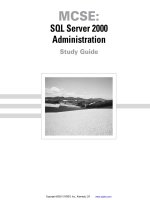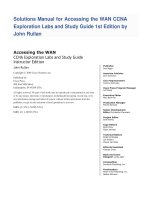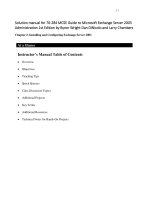Solutions manual for 70 228 MCSE guide to MS SQL server 2000 administration 1st edition by mathew
Bạn đang xem bản rút gọn của tài liệu. Xem và tải ngay bản đầy đủ của tài liệu tại đây (272.25 KB, 8 trang )
Solutions Manual for 70 228 MCSE Guide to MS SQL Server
2000 Administration 1st Edition by Mathew Raftree
Link full download test bank:
/>Link full download Solutions Manual:
/>
Chapter 2: Installing and Upgrading SQL Server 2000
Objectives
After reading this chapter and completing the exercises, students will be able to:
Understand hardware and software requirements before installing or upgrading SQL Server 2000
Install SQL Server 2000
Upgrade an existing installation of SQL Server 2000
Troubleshoot installations and upgrades
Teaching Tips Hardware and Software Requirements of SQL
Server 2000
1.
Discuss with the class the hardware requirements necessary to begin a successful installation. Point out
that these are the minimum requirements and that each deployment of SQL Server 2000 will have
different hardware requirements to meet storage and performance needs.
2.
Mention that in a typical production environment, a server with at least two Pentium processors and 256
MB or RAM is a good rule of thumb to use.
3.
Review Table 2-2 pointing out the various operating systems that the different editions of SQL Server
2000 can run on.
Additional Software Requirements
1. Describe some of the additional software requirements for SQL Server 2000 installations:
•
•
•
Internet Explorer 5 must be installed
If Windows NT Server is the operating system, Service Pack 5 or higher must be installed prior to
SQL Server 2000 installation
IF XML is going to be used, Internet Information Services must be installed prior to a SQL Server
2000 installation
13
Installing SQL Server 2000
1.
Consider installing SQL Server 2000 in a location where you have a projector and smartboard. The
smartboard allows you to use it as a touch screen so the class can see each step of the process and you
can point out each option or component as it is displayed.
2.
Explain the assumptions being made about this installation:
•
•
•
3.
The SQL Server will be used by a large-scale Web site for storing catalog information and
processing transactions
The target computer will be running Windows 2000 Advanced Server and it has two processors
The target computer has a single hard drive (designated C:\)
Review with the class any other requirements that are necessary prior to beginning the setup process
such as logging on as the local administrator, shutting down the Event Viewer and Registry Editor, and
shutting down any services that are dependent on SQL Server.
Running the Setup Program
1.
Demonstrate and explain each of the options on the installation screen. Ground the students in each
option.
2.
Click the SQL Server 2000 Components menu item to bring up the next screen. Then click on Install
Database Server option to begin the installation process. Now click the Next button on the Welcome
screen. This will bring up the Computer Name screen.
Installing SQL Server on a Local Computer
1.
Explain to the class each step of the installation process as it is displayed on the screen. Emphasize the
options they will encounter and why certain options are being chosen.
2.
Depending on the services running there may be different options installed. Be sure to point these out to
the class and discuss what is happening with each choice.
Collation Considerations
1.
Share with the students that collations control the physical storage of character data in SQL Server
2000. The default collation is based on the Windows locale of the computer on which SQL Server 2000
is being installed.
2.
Talk about the components that make up a collation including single-byte characters, code pages,
double-byte pages and Unicode.
3.
Emphasize that when determining the appropriate collation, the first place to look is to the group of
people who will use the system. If they all speak the same language then choose the specific collation
for that language. If they speak multiple languages, then choose the collation that will support all of the
languages.
4.
Describe the various network library options and explain when they should or should not be installed.
14
5.
Introduce the two licensing options for SQL Server 2000. Per Seat licensing is based on the number of
devices that will connect to SQL Server 2000 and Processor Licensing is calculated on the number of
processors (CPUs) that the SQL Server computer has.
Failover Clustering Considerations
1. Talk about failover clustering and how it is implemented where there is a high availability requirement for
a deployment. Illustrate how nodes, cluster groups, and heartbeats work together to keep database
processing going without the end user noticing any disruption.
Advanced Installation Options
1. Share with the students the concept of unattended installation by using the “Record Unattended .ISS file”
option. All the prompts for an installation are provided but the selections are used to build an
unattended installation file instead of actually installing SQL Server 2000. Once this file has been
created, one can run the setup program with this .ISS file in an unattended install.
SQL Server 2000 Upgrades
1.
Discuss the upgrade options available from previous versions of SQL Server to SQL Server 2000 as
well as upgrading from Standard Edition to Enterprise Edition.
2.
Illustrate that they only have to select the “Upgrade, remove, or add components to an existing instance
of SQL Server” option to trigger SQL Server 2000 Setup to detect the current version of SQL Server
that is running and present a list of upgrade options
3.
Stress that the Setup program has built-in recovery processes that resume an upgrade automatically in
the event of a failure.
Upgrading from SQL Server 7.0
1. Explain that there are two ways to upgrade databases to SQL Server 2000 from version 7.0. The first
option is to upgrade all of the underlying components and the existing database by using the SQL
Server 2000 Setup program. The second option is to use the Copy Database Wizard to move databases
from a version 7.0 installation to an existing version 2000 instance.
Upgrading from SQL Server 6.5
1.
Remind the students that the differences between version 6.5 and 7.0 are so great that a straight upgrade
cannot be performed from version 6.5 to 2000.
2.
Go over each upgrade step and using a projector, demonstrate the procedure to upgrade from version
6.5 to 2000 using the SQL Server Upgrade Wizard.
3.
Emphasize that once the upgrade is complete, the computer will have both a SQL Server 2000 instance
and the preexisting SQL Server 6.5 installation. Both will be fully operational and can be managed
from unique sets of the graphical administrative tools.
15
Upgrading Editions of SQL Server 2000
1. Point out that upgrading editions or functionality of SQL Server 2000 is easily accomplished by running
the Setup program and selecting the “Upgrade, remove, or add components to an existing SQL Server”
option. They will then be prompted to either upgrade the current edition or to add components that are
not already installed.
Troubleshooting Installations and Upgrades
1. Stress that even with all of the automation and detection facilities of the Setup program, things can still go
wrong. If a problem occurs that is not documented in the Books Online, one can access the
Troubleshooters Web site at HTTP://support.microsoft.com/support/tshoot/.
Useful Files for Diagnosing Problems
1. Explain that SQL Server Setup creates three files that can provide information about problems that occur
during an installation or upgrade. These files are:
•
•
•
Sqlstp.log which records any errors that occur during the configuration portion of Setup
Setup.log is located in the \WINNT folder on the system drive of the target machine
Error.log contains the most recent error log for SQL Server 2000
Quick Quiz
1.
In a typical production environment, how many processors and how much RAM will be in the server?
Answer: There will be at least two Pentium processors and 256 MB of RAM.
2.
Will Netscape Communicator work with SQL Server 2000?
Answer: There may be some times that it will work, but Microsoft requires Internet Explorer 5 to be
loaded.
3.
What is the default collation based on?
Answer: The default collation is based on the Windows locale of the computer on which SQL Server
2000 is being installed.
4.
While running the Setup program, where should one turn if there are problems?
Answer: Books Online should be the first place one turns and next the Microsoft Troubleshooters web
site, HTTP://support.microsoft.com/support/tshoot\, should be accessed.
Class Discussion Topics
1.
Take some time and discuss the installation process and review and steps the students find to be
confusing.
2.
Discuss the different option screens and why you would choose one option over another.
Further Readings
16
1. Review the Microsoft Troubleshooters web site and determine possible problems that might arise during
an installation and the recommended solutions to those problems. This site can be found at the
following location HTTP://support.microsoft.com/support/tshoot/.
Technical Notes for the Hands-On Projects
The lab setup for the Chapter 2 hands-on projects includes the following elements (see the table):
Computer with Windows 2000 Advanced Server installed
Microsoft SQL Server 2000 installed
HANDS-ON
PROJECT
NETWORK
DEVICES
REQUIRED
2-1: Determine if
computer
meets
minimum
hardware
requirements
2-2: Verify the SQL
services have been setup
properly
HANDS-ON
PROJECT
2-3: Review the
directories created by
the installation scenario
2-4: Inspect registry
entries created by the
installation scenario
2-5: Verify the
installation with the
Query Analyzer Tool
2-6: Use SQL Server
Licensing tool to change
licensing information
NETWORK
DEVICES
REQUIRED
WORKSTATION
OR SERVER
OPERATING
SYSTEMS
REQUIRED
Computer with
Windows 2000
Advanced Server
installed
OTHER
RESOURCES REQUIRED
Computer with
Windows 2000
Advanced Server
installed
WORKSTATION
OR SERVER
OPERATING
SYSTEMS
REQUIRED
Computer with
Windows 2000
Advanced Server
installed
Computer with
Windows 2000
Advanced Server
installed
Computer with
Windows 2000
Advanced Server
installed
Computer with
Windows 2000
Advanced Server
installed
Microsoft SQL Server 2000
installed
17
OTHER
RESOURCES REQUIRED
Microsoft SQL Server 2000
installed
Microsoft SQL Server 2000
installed
Microsoft SQL Server 2000
installed
Microsoft SQL Server 2000
installed
Solutions
Answers to the Chapter Review Questions
1.
What is the recommended amount of RAM for SQL Server 2000 Enterprise Edition? Answer: c.
128 MB
2.
What defines the set of rules for how characters are sorted and evaluated by comparison
operations? Answer: a. sort order
3.
Single-byte code pages support how many unique characters? Answer: a. 256
4.
What is used to upgrade a version 7.0 installation to a version 2000 installation? Answer: d. SQL
Server 2000 Setup program
5.
In a high-volume Web site scenario, which licensing option is typically chosen? Answer: a.
Processor Licensing
6.
What is the default installation folder for SQL Server 2000? Answer: b. C:\Program
Files\Microsoft SQL Server\
7.
When multiple instances of SQL Server 2000 are installed on a single computer, which of the
following is one of the resources that is shared across instances? Answer: c. MS Search service
8.
Which of the following features is not affected by setting up the SQL Server service to log on
using the local system account?
Answer: c. exporting data using Data Transformation Services (DTS)
9.
What software do the graphic administration tools and SQL Server Books Online require? Answer:
c. Internet Explorer 5
10. Which of the following cannot be accomplished with the SQL Server 2000 Setup program?
Answer: c. upgrade a version 6.5 installation to version 2000
11. What is the name of the log file containing errors that occurred during the Setup program?
Answer: c. Sqlstp.log
12. The default collation for a new installation of SQL Server 2000 is based on? Answer: b. the
windows locale of the local machine
13. What application must be installed on a computer prior to installing SQL Server 2000 if the XML
features are going to be used?
Answer: a. Internet Information Server 5 (IIS 5.0)
14. Which of the following is not an option on the Installation Definition screen of the Setup program?
Answer: c. OLAP Tools
15. What is the file extension for an unattended installation file? Answer: c. .iss
16. Which feature of SQL Server 2000 is especially important to Application Service Provider (ASP)
companies?
Answer: b. multiple instances
18
17. A company uses SQL Server 7.0 to manage research information. Each of the users has access to
SQL Server through a logon and password that are managed by SQL Server. The IT department
wants to upgrade to SQL Server 2000 and it wants to continue to use the logons provided by the
previous SQL Server 7.0 installation. Which authentication mode should you choose when
upgrading their version 7.0 installation?
Answer: a. Mixed Mode
18. A company wants to install SQL Server 2000 Standard Edition on three separate computers in
three different countries. The three installations will not interact with each other, and each one will
have users that speak a different language (requiring a different collation. However, all three of the
computers will reside in a single hosted facility and have the same Windows locale. Which
installation strategy should be used in this situation?
Answer: c. perform a custom installation on each computer
Case Projects Case 1
In this case each machine will have very different requirements. The development and testing computer
should probably be installed with SQL Server 2000 Developer Edition because it provides all the
features of the Enterprise Edition, but at a reduced price. Since there is only a small number of
developers working on the HR application, it probably makes the most sense to use a per seat licensing
scheme.
The computer that will house the live application is an entirely different story. To support such a large
user population (1000), SQL Server 2000 Enterprise Edition should be installed. The most cost
effective licensing would be per processor licensing in this situation as well.
Case 2
The potential client has very reasonable requirements that are easily met by SQL Server 2000. In order
to support multiple languages various collations can be used to store extended character information
properly. SQL Server 2000 provides full support for unicode data so even languages like Chinese and
Japanese (each with a large set of unique characters). Another powerful multilingual feature of SQL
Server 2000 is the ability to specify collations all the way down to the field level in database tables.
Scalability is another common concern with all large, mission critical applications. SQL Server 2000
can scale to support a very large database by using federations of servers. This allows data to be
distributed across multiple computers but still act as a single database. Distributed partition views
would be developed to aggregate data on separate machines into a single queriable object. With true
support for Windows 2000 Datacenter Server, a single instance of SQL Server 2000 can utilize 32
processors simultaneously.
In order to prevent system downtime in the event of a hardware or software error, SQL Server 2000
supports failover clustering through Microsoft Clustering Service. This allows a hot standby server to
turn on automatically in the event of a failure on the production server. Other options to improve
availability concern using hard drive arrays (RAID) as discussed in chapter 6.
Case 3
The simplest solution to the problem is to install SQL Server 2000 at the headquarters office and be
sure to record an unattended installation file (ISS). This file can then be distributed to the IT workers in
19
the other offices so that they can simply run the SQL Server 2000 setup program and specify the ISS
file. This will ensure that all of the instances installed will be identical. This is a good solution because
it does not require a trip around the country for you to install SQL Server 2000 at each and every office.
The IT workers in the other offices will not gain any familiarity with SQL Server 2000 if you use this
strategy though. It could be more valuable to have them install an instance themselves based on a script
you prepare for them. At least this way, IT workers in the satellite offices will gain some exposure to
the product
20









